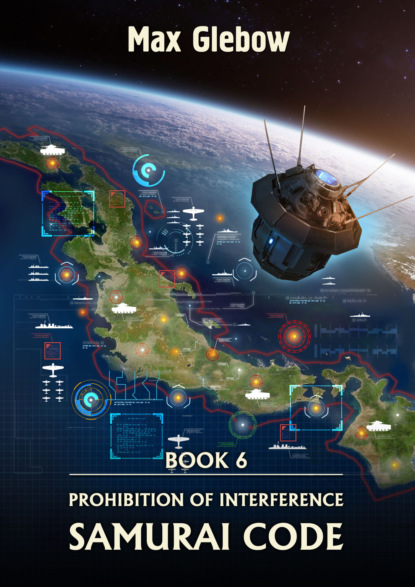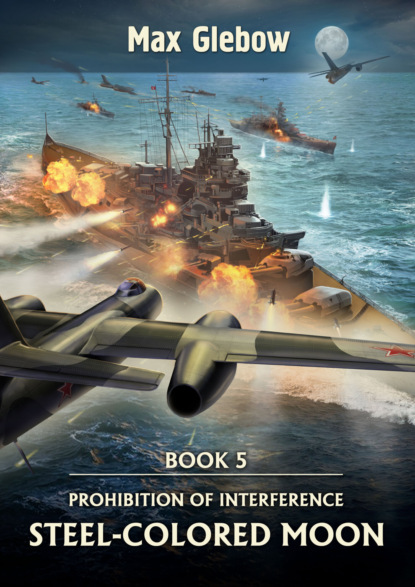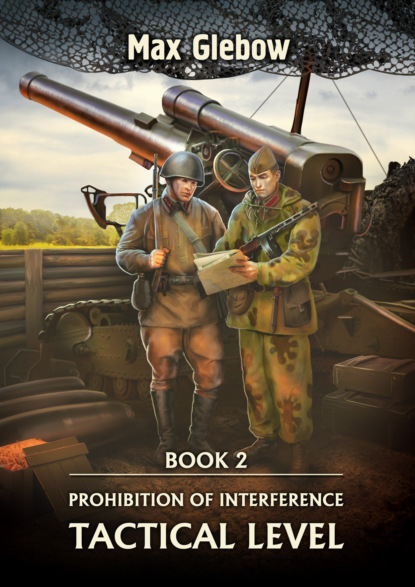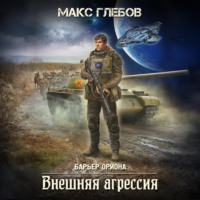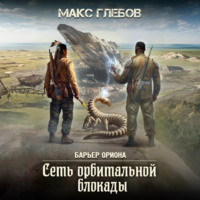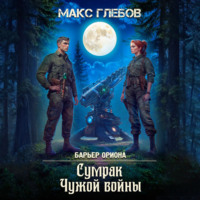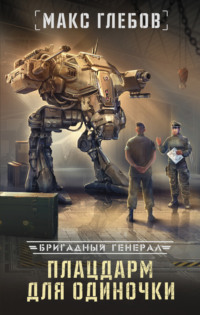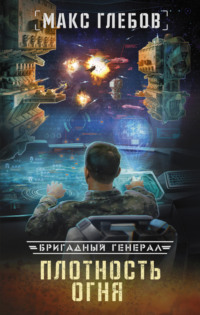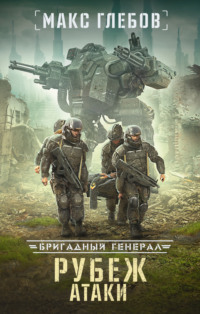
Полная версия
Prohibition of Interference. Book 1
I lay behind a low embankment and thought, with an inner shudder, that now our First Lieutenant would rise to his full height and try to raise us to attack – with a dozen rifles for his men and bare hands for the rest of us. However, it did not happen.
“Sergeant, distribute weapons to the Red Army men!” Fyodorov ordered softly, but clearly.
“There aren't enough rifles for everyone, Comrade First Lieutenant. Who do you want to give them to?”
“Give one to Nagulin. To the others, as you can.”
“Yes.”
The Germans, meanwhile, had stopped. One of them was helping a wounded man at the motorcycle closest to us. The driver of the third motorcycle, which appeared from around the corner, immediately turned his vehicle around and drove back. Apparently, he was going to report the incident to his superior. Another German was moving slowly toward Fyodorov's position, trying not to block the range of fire of the machine gunner protecting him.
I finally got my hands on a gun and three cartridge magazines. Five rounds in the rifle and another 15 in the ammo bag. Not much, but thanks for that, too.
The enemy motorcyclists made sure that none of the attackers remained alive and settled back into their vehicles, taking the weapons of the dead. The wounded man was taken to the rear, while the remaining Germans waited for their comrades, who had gone to report to the commander, and once again rolled leisurely down the road toward us.
“Squad, to battle!” Our First Lieutenant, who knew no doubt, gave the order. The enemy must be destroyed wherever you meet him, and by all the means at your disposal. Such was the paradigm of this cruel time. Red Army soldiers and commanders were taught this in army manuals, and it was drummed into them in numerous classes by teachers and political officers until it became an integral part of their consciousness. The good thing, at least, was that Fedorov was aware of the importance of the effect of surprise, and gave the order quietly enough.
I decided to try to prevent this madness after all.
“Comrade First Lieutenant, there, just around the corner, are two armored personnel carriers with infantry and several more trucks!”
“You know too much, Nagulin!” hissed the First Lieutenant, “Maybe I shouldn't have given you that rifle. Why don't you tell me where they came from? And where are our units?”
“You know what I mean, Comrade First Lieutenant,” I answered softly, fearing greatly that I might be told to be silent again. But apparently the advance warning of the enemy had given me some credit in the eyes of my commander, and he preferred to hear me out after all.
“If the Germans are already here, it means that the Khristinovka station has long been captured by them, and the front is broken through. Our units apparently withdrew to the south and north. No cannonade can be heard in front, but on the right and especially behind, the rumbling grows stronger and stronger.”
Of course, I didn't say everything I knew. The Germans we ran into were one of the forward units of the 125th Wehrmacht Infantry Division. We were already so far into the mousetrap that Uman and its environs have become, that there were no normal escape routes left. To break through to the west would be pure madness. Even if there are Red Army men there, they are only the remnants of defeated and surrounded units. There was also no point in going north, in the direction of Kiev. The place was now packed with German infantry, which was pulling up after the motorized units that had moved forward to Talny. And even if we had broken through there, we would not have had any prospects, because we would have fallen into a new, even larger pocket, which was also already marked with all certainty around the capital of Soviet Ukraine. Three selected German divisions, two of which are tank divisions, are waiting for us in the east, and we have absolutely nothing to gain in this direction. That leaves the south, but there we will at best find units of the 6th and 12th Armies surrounded. Of course, this is much nicer than being taken prisoner by the Germans right away, but it's also pretty bleak prospect.
“Stop panicking, soldier!” said the First Lieutenant, as if trying to kill me with his gaze, but somewhere in the depths of his pupils I saw uncertainty and even fear. The Commander understood that I was right, he understood it very well, but he tried not to show it in front of his subordinates.
“That's right, Comrade First Lieutenant,” I answered, raising my hand to my cap, “We have one way left – to the south. That's where our units should be. At least they'll give us normal weapons. And with two dozen rifles against five machine guns we'll achieve nothing anyway, we'll just lay here all for nothing, without doing the enemy proper damage.”
I saw something very bad in the looks of the First Lieutenant and the Sergeant. I don't even know how it would have ended for me, but then the first Hanomag came out of the woods, roaring with its engine and clanking its caterpillars. I could clearly see a machine gun mounted on top of the cabin of the armored personnel carrier and rows of helmets above the armor.
“We'll finish with you later,” Fyodorov told me, and, ducking down, ran somewhere to the right flank, “To the battle! Squad, fire on the Nazi invaders!”
Well, that was it. Let him throw himself under the tracks, but there are more than a hundred young guys, most of them unarmed! I grabbed my rifle comfortably and looked around. Shots rang out around me indiscriminately, and the unarmed men just lay on the ground, keeping their heads down to avoid the hail of bullets that rained down on our low shelter from two sides – from the motorcycle patrol that had gone forward and the Hanomags that crawled out from behind the forest. German infantrymen were already jumping briskly out of the backs of armored personnel carriers and taking positions in the ditch, clearly preparing for an attack.
“Why aren't you shooting, Nagulin?” the deputy commander roared above my ear.
“I am choosing my position, Comrade Sergeant,” I answered as firmly as possible, “We have to shut up the machine guns, or we'll all get killed here.”
“Fire, soldier! Or I'll shoot you myself!”
“You can shoot me after the battle, Comrade Sergeant, but right now don't get in the way,” I answered angrily and crawled a few meters to the left, where a dust cloud rose from the machine gun burst that had recently rattled on the embankment.
Continuing to test the sergeant's patience was simply dangerous. I closed my eyes for a second to look at the battlefield from above. The greatest threat to us now, oddly enough, was not the Hanomags, but the two machine guns on the motorcycles that passed us by. These Germans were much closer to our position and shot much more accurately than the machine gunners from the armored personnel carriers.
I targeted the motorcycle closest to us, relaxed my arms and shoulders a little, went into combat mode and with a sharp movement I lifted myself slightly above the embankment. The plop of my shot was lost in the crackle of machine gun bursts and rifle fire. I didn't look at the result and immediately hid behind the embankment. Nevertheless, I was spotted, and several bullets struck the rails at once with a rumble.
“One down,” I told the Sergeant, once again taking advantage of the 'view from above', I'll change position and silence the other.”
“Are you sure you hit him?” Pluzhnikov asked incredulously.
“I'm sure,” I nodded affirmatively, “but I don't recommend checking right now. I'll calm down the other one, then it will be safer.”
“He doesn't recommend…” The Sergeant started, but I wasn't listening, crawling quickly to the left.
Shot! A sharp pain jerked my temple, but I didn't even notice it right away. This time the Germans seemed to be purposefully waiting for my head to appear over the rails, though not quite where I actually ended up. But the German gunner showed excellent reaction. I was lucky that it wasn't a bullet that hit me in the head, but a pebble that it knocked out of the embankment. But it rang a very bad bell for me. If I keep getting exposed to enemy fire like this, my glorious journey on this planet may be over before it has even begun.
“It's done,” I nodded to the Sergeant.
Machine gun fire on our flank subsided, and Pluzhnikov peeked out from behind the embankment to assess the situation.
“Three of the four Germans are intact,” he said as he crawled back down, “They're at the machine guns. One is behind the motorcycle, but he's moving – wounded, probably. And you said you took down two.”
“Are the machine guns silent?”
“Silent,” agreed Pluzhnikov.
“Both of them?”
“Both.”
“So I've done my job. Now, Comrade Sergeant, I have a reasonable initiative, but I need assistance. Will you render it to me?”
Pluzhnikov didn't have time to answer. We were interrupted by the distinctive pops of shots from German infantry mortars. It would be foolish to hope that the forward section of the German infantry division would forget to take this compact and very effective weapon with them. The Germans had such a Rheinmetal product in every platoon, and now we had the pleasure of experiencing what it was like, to have 50-millimeter mines dropped on your head.
“Get down!” yelled the Sergeant, obviously familiar with this enemy weapon.
I was lying down, but the Red Army men, huddled in a tight group along the embankment to our right, did not react immediately to the command. For the first time we were lucky and the mines fell short, but continuing to play this roulette game was not just dangerous, but criminal.
“Comrade Sergeant! We need to take the men away. Otherwise everyone will be chopped up! We don't even have individual cells dug, not to mention trenches, and the embankment won't protect against mines. There's a gully between the hills that's a good escape route. And there is a forest there…”
“There was no order to retreat,” the Sergeant cut off, lifting himself up over the rails and firing toward the enemy, “Don't you know the regulations, soldier? The enemy must be boldly and swiftly attacked wherever he is detected!”
I mentally groaned. If anyone here didn't know the regulations, it was the Sergeant and our Commander. So many great guys have already died because of that phrase, that was hammered by political officers into the heads of Red Army soldiers and commanders with wanton ruthlessness, it just made me want to howl. And no one even once remembered that this phrase refers only to OFFENSIVE combat, as the Red Army Field Manual of 1939 says quite unambiguously. What are we doing now? Are we fighting an offensive battle? But I couldn't have a military-theoretical debate with an NKVD sergeant right here, under mortar fire!
The second series of mines flew too far, but the embankment did not cover us on this side, and the cries of the wounded showed that the shrapnel had found its targets.
“I need your help, Comrade Sergeant,” I reminded Pluzhnikov, “We need to silence the machine guns on the Hanomags, or they'll keep pinning us to the ground, and the mortar men have almost zeroed in.”
“What have you got in mind now, Nagulin?” the Sergeant turned to me, rolling down the embankment after another shot.
“Do you see this knoll?” I showed Pluzhnikov to a small hill in our rear, overgrown with bushes and small trees, “I'm a pretty good shot, as you may have seen, and there's a very promising sniper position. I'm sure I'll get German machine gunners from there, and maybe even mortar crews if they're in direct line of sight. The First Lieutenant ordered you to keep an eye on me, and I need a second man to control my surroundings anyway – the Germans are not fools, they can outflank us. Will you help me?”
Pluzhnikov looked like a smart man, though he was severely damaged by the local political system. He didn't hesitate for more than a second – combat puts a lot of things into place in a head.
“Follow me, soldier!”
That was the right thing to do. If you can't prevent a subordinate's insane scheme, you have to lead it!
We quickly covered the distance of 50 meters to the gully. I had time to think that our maneuver might look like desertion and an attempt to leave the battlefield, but the Red Army men and the First Lieutenant obviously didn't have time for us right now. Of course, they should have spread out along the embankment…
We reached the position I had chosen in less than a minute, but in that time the position of our unit had changed dramatically for the worse. Another series of mines fell almost exactly behind the embankment, and the number of dead and wounded increased noticeably. Good thing the Germans only had three mortars, or it would have been over long ago.
“Hurry up, Nagulin,” Pluzhnikov poked me lightly in the back as we climbed the hill. Apparently, what he saw from above did not please him much.
“Yes, Comrade Sergeant,” I answered, raising my rifle.
It was about 400 meters from here to the Hanomags. The German infantry had already deployed in a chain and started moving toward us, shooting incessantly, soldiers strived to help their machine gunners to keep our fighters off the embankment. To my surprise, the Germans never attempted a flanking movement. Apparently, they thought they could handle such a weak enemy without it. Now we'll see.
After another close look at the German positions from above, I discovered where the mortar men had set up. They were doing the most damage to us now, and we should have started with them. Unfortunately, the distant Hanomag was blocking one of the mortar crews from me, but the other two mortars were visible quite well. Of course, I couldn't spot enemy positions by observing the Germans from here, but looking from orbit gave me a lot of advantages, and I was going to make the most of them.
I fired the first three shots almost without pause, two at the crew of the mortar on my right, and one at the machine gunner of the Hanomag in front of me.
The rifle's magazine was empty, and I silently held out my hand for the Sergeant's weapon. He was about to say something back, but he looked at the enemy soldier slumped behind the machine gun and handed me his rifle.
The German infantry mortar crew consisted of two men, so three more of my shots silenced the second mortar and the last machine gunner on the rear armored personnel carrier. I tried not so much to kill enemy soldiers as to damage their weapons, so I aimed more at them. It's not hard to replace a dead machine gunner, but there's usually nothing to replace the machine gun during combat. The same can be said for a mortar, but it is harder to damage with a rifle bullet. In any case, the firewall, which had pressed our squad to the ground had weakened dramatically; all that remained was to silence the third mortar.
“It's time to change positions, Comrade Sergeant. If we've been spotted, the mines will fly here.”
I, of course, was exaggerating. The crew of the third mortar, greatly impressed by the almost instant deaths and wounds of their comrades, stopped firing and also decided to change position, which was only to our advantage. I hoped that the place where they would move would not be covered by the carcass of an armored personnel carrier.
We ran to the right, went back down into the gully, and quickly climbed the next hill. This position was less convenient, but now I could see the crew of the enemy's third mortar. Pluzhnikov loaded my rifle and gave it to me, taking his rifle back. I fired two more quick shots, and the chain of German soldiers, which was approaching our position, was finally deprived of fire support.
The First Lieutenant's men perked up and began firing at the enemy as intensely and accurately as they could with the means at their disposal, while the Germans, on the contrary, faltered somewhat because of the sudden change in the situation. I remembered that the enemy had at least one more machine gun on the third motorcycle, but I couldn't see where it was now, even using the satellite panorama. Around the bend in the road, three trucks stopped without coming under our fire. German infantrymen were now jumping out of two of them and, spurred on by commands from noncommissioned officers, were running straight through the woods to help their comrades.
I fired a few more shots in an effort to add confusion to the enemy's battle lines.
“Comrade Sergeant, we have to get the men out immediately before the Germans regroup and come to their senses. We have a lot of wounded. This is the best moment to pull back – we won't be able to break away later.”
Pluzhnikov glanced at me and opened his mouth for another rebuke in the spirit of the earlier quotation from the army manual, but the reality of the brutal battle must have shifted something in his obviously intelligent head, and instead of another crackling phrase he muttered only, “I have to report to the Commander,” and started ducking down the hill.
And then something happened that I tried not to believe, but which I was still afraid of somewhere inside. Below, at our positions, a discordant "Hurrah!" erupted, and about 50 Red Army men – all those who could still stand on their feet – rushed into a counterattack, led by the First Lieutenant. Less than half of them had rifles. Others clutched stones in their hands, and some simply ran toward the enemy with empty hands, aided only by a fierce shout.
“Why?!!!” I just didn't have the words to express my indignation and incomprehension, but now I had no choice but to support this suicidal counterattack with fire.
Machine guns started firing from the forest again, three at once. Apparently, the Germans from the trucks brought them with them. And I, naive as I was, thought how I could explain to Pluzhnikov and Fyodorov that even if we beat off the Germans now, in half an hour we would be flanked or destroyed by artillery fire, or rather both at the same time. But they won't outflank us, because none of us will be left alive.
I fired as fast as I could with my rifle, and at the same time yelled at the Sergeant who had gone down, to come back and get ammunition, but Pluzhnikov didn't seem to hear me.
After a minute my small ammunition ran out, and the Germans still had one machine gun, and a pair of 50-millimeter mortars started firing again. Of those who had risen in the counterattack, which almost instantly collapsed, only ten men were able to return under the cover of the embankment, but even there mines were already bursting, at least not very densely.
Encouraged by their success, the Germans moved forward again. No one else fired at them from our side. That's when I saw the Sergeant. Pluzhnikov tried to stop the Red Army men running toward the gully, but the men no longer had any moral strength to keep fighting. The beating at an unfortunate position and the ensuing counterattack, completely ill-conceived and unprepared, broke their morale and will to resist.
It was all over very quickly. The German soldiers reached the railroad, stopped, threw a dozen grenades across the tracks, waited for the explosions and jerked their way over the embankment. There didn't seem to be any survivors at our former squad position. Only those Red Army men who managed to run to the gully were able to escape.
Chapter 5
The Germans did not pursue us. Apparently, they had their orders, and their commander considered it inexpedient to be distracted from carrying them out. I went to catch up with the rest of our detachment going north, where we absolutely should not have moved, but the road to the south was cut off by the German column, and the west and east seemed to me no better than the north.
It took me several hours to find the Sergeant, and that was only thanks to the data from the orbit. So far, I have been an absolutely untalented pathfinder. My entire practice of walking through the woods was reduced to a couple of weeks of trekking through the taiga, again with the help of satellite navigation. What I had in abundance was stamina and good coordination of movement, so that I could still move over rough terrain quite quickly.
Pluzhnikov and three other fighters stopped for a halt in the middle of the forest – they evidently were afraid to go out into the open. The Sergeant and two Red Army men were sitting on the trunk of a fallen tree eating stew from a crumpled can, drinking water from the flasks and eating rye bread. The fourth fighter, in whom I recognized Boris with a joy that surprised me, stood at his post, gazing intently into the woods. He didn't try to take cover or even sit down, but he was turning his head with a zeal worthy of better use. As a result, I noticed him first, although, in theory, it should have been the other way around.
“Boris!” I called softly to the sentry.
The soldier twitched, grabbing his rifle, and I hastily added:
“It's me, fighter Nagulin. I come out slowly and empty-handed.”
I threw my rifle behind my back, and walked leisurely toward my comrades' camp.
“Are you alone?” asked the Sergeant, who jumped up at the first sound of my voice and almost dropped the can of stew on the ground.
“Alone,” I confirmed, “no one followed me, I seem to be the last one. What about the Commander?”
“He was killed at the very beginning of the counterattack,” answered Pluzhnikov briefly looking me in the eyes, “he was shot down with the first burst.”
“Comrade Sergeant, permission to ask you a question?”
“No permission, Nagulin. We'll talk later, I'll call you myself,” the Sergeant cast an expressive glance at the Red Army men gathered around us. “Soldier Sintsov!”
“That's me!”
“You're on duty.”
“Copy that!”
“Chezhin and Nagulin, eat quickly, and we have to keep moving.”
I checked around just in case, but found no immediate danger. We were in a relatively secluded spot that the German convoys crawling along the roads didn't care about yet.
“Fall in line,” the Sergeant commanded quietly as we finished our can of stew and ate the rest of the bread, “Listen to the battle order! Given the unfavorable change in the situation and the death of First Lieutenant Fyodorov, our main task is to get to our troops as soon as possible. As a senior officer, I take command of the squad. My deputy is Red Army man Nagulin. We will break through to the east by the shortest route. We move stealthily, do not engage in combat with the superior forces of the enemy. Whoever opens fire without orders – I will shoot him personally. Any questions?”
“Comrade Sergeant, where are we on ammunition?” I immediately asked, “My ammunition is all used up.”
“Weapons and ammo for inspection!” The Sergeant nodded, and was the first to take the magazines out of the ammo pouches.
We had three rifles and forty rounds of ammunition for the five of us. It wasn't just a paucity, it was nothing at all. Pluzhnikov gloomily examined this wealth and gave out a somewhat unexpected solution for everyone:
“Chezhin, Nagulin and I take the rifles. Chezhin and I get ten rounds each, Nagulin gets 20. Sintsov goes to the head patrol. The rest of the group sticks together. Chezhin, you watch the rear. Nagulin, you're the sniper anyway. You don't go forward, you choose your own position and cover the squad's actions.”
“Copy that!”
“Any questions?” The Sergeant looked at us again. “Well, if there are no questions, let's move out.”
After all, it was the East. The Sergeant's logic was quite understandable, and I did not argue. First of all, everything was so mixed up right now that I couldn't tell which way was safer to go, and secondly, I still couldn't clearly explain to Pluzhnikov the reason why we shouldn't go east.
I wasn't going to reveal my capabilities to anyone. Too many forces here would want to put them under their control, and it was not in my plans to become a puppet in the hands of the powerful. So I had to relate any of my words and actions to the possibility of rationally explaining them within the framework of existing realities, as well as the level of knowledge and skills that an ordinary Red Army man, albeit a hereditary hunter and taiga resident, might possess.
We cautiously made our way through the woods, looking around carefully, and I also strenuously pretended that I was expecting some kind of nastiness from every bush, although I knew perfectly well that the nearest Germans were now four kilometers away and were on foot on the road to Talnoye. It was the rear units and infantry hurrying after the mechanized formations that had surged forward and had almost closed the ring around the Soviet armies trapped in a pocket.


